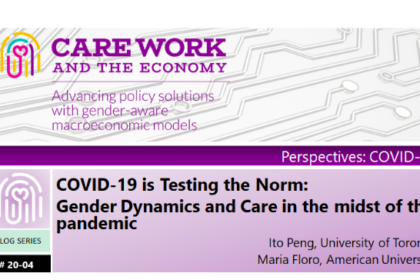
The COVID-19 crisis has upended lives around the world. It has forced cities and countries to enforce lockdown and social distancing regulations. Schools and businesses are closed and people are told to self-isolate, stay home, telework (if your job allows), to not go out except to get essential things, and care for each other but in distance. For those who live on their own, COVID-19 is about learning to live with solitude and loneliness, except for the occasional video, online or phone chats. For others who are living in a family, it is about living together in a confined space, 24/7, balancing work and family responsibilities, and rearranging the share of housework. The COVID-19 crisis is not just leaving a trail of human and economic sufferings; it is also testing prevailing gender norms as it confines both paid and unpaid work activities for many households within the same space.
Amongst the many lessons that the COVID-19 pandemic is teaching us, one of the most important is the centrality of care in maintaining a healthy, balanced and functional society and economy. Additionally, how much of that care is implanted in and shaped by our social and cultural norms. These norms vary by culture, class, caste, ethnicity, religion, and life cycle stage. Before the COVID-19, most of us had regular normal lives: during week days, children went to schools and adults either went to work or were looking for work. Frail elderly and disabled people were given necessary care by family members, relatives, domestic/ personal service workers or care service institutions. During weekends and holidays, social, religious, cultural, and leisure activities alongside weekend domestic chores filled people’s time.
But that was before the COVID-19; it is not the same anymore. The stay-at-home, social distancing and travel restrictions have forced household members to be physically together day and night. Without the vital and often taken-for-granted services such as daycares, after school programs, and community centre activities, and without opportunities to engage in social activities with other people, many households are suddenly faced with the challenges of having to both doing market work and care for their children as well as the sick, disabled, and frail elderly member needing care. It seems that the lived experiences of informal home-based women workers are now shared by millions around the world who have dependents: the constant juggling of different demands on one’s time and the stress of having to frequently multi-task. On one hand, there is the increased level of unpaid work that needs to be done, and on the other, the necessity to earn one’s livelihood from home. Many households therefore are faced with – for the first time – the imperatives of having to share the heavy burden of unpaid work. Will it be the usual division of household work as in ordinary “normal” times? Or will the situation at hand involve new negotiations and allow some upending of gender roles?
In unexpected ways, the COVID-19 health crisis has opened windows for women and men to see and experience the other “gender” role up close and personal: those not in the labor force see and hear the day-to-day business of earning a living ala “online”, while the “breadwinners” see and hear children needing attention, help with schoolwork, crying in the background, etc. In some households, men are now more willing to take on more care work, do the laundry, clean house and cook some meals. But in other households, the current situation may intensify existing unequal gender relations and heighten tensions. Male household heads for example, may deliberately utilize traditional gender norms to maintain discipline and control. For example, women are expected to find ways of combining childcare and market work by multi-tasking or lengthening their workday in order to reduce to the minimum any distraction or job interruptions to the head. In other cases, the angst associated with no social contacts or support, employment-related anxiety and growing economic insecurity may lead to increased drinking, rising tensions and even domestic violence. Fearful of the loss of their masculine identity, men may reinforce women’s submission to patriarchal rules in the household. Unfortunately, the situation created by the COVID-19 limits the options for women to seek help when they face threats to violence or are victims.
As social norms continue to evolve and traditional gender roles within households are tested in varied ways, one thing is clear: the COVID-19 crisis is exposing, and disrupting, the core system that supports our society and underpins our economy – the mixed economy of care. In ordinary or “normal” times, our lives are made manageable and our economy sustainable because different social institutions are providing different kinds of care in both paid and unpaid forms. These include public and private institutions, such as schools, hospitals, community centers and other social and community services providing essential health, education, and other social services; within the household (mainly women) doing unpaid essential care and domestic work. We take for granted this care delivery system, especially those institutional arrangements involving unpaid labour. We forget that care collectively provided by all these institutions play an important role in supporting us socially and economically. The COVID-19 crisis is teaching us that we are all socially and economically interdependent: we all give and receive care throughout our lives, and that we must recognize, understand and find ways to ensure that care work is valued. It is also giving us the opportunity to reflect on how the responsibility for and the cost of providing care can be better shared within households as well as within society – and on how we might better restructure our mixed economy of care.
This blog was authored by Ito Peng and Maria Floro
